11 Ways to Keep Your Pool Safe for Kids – What You Need to Know!
-
Pete Ortiz
- Last updated:
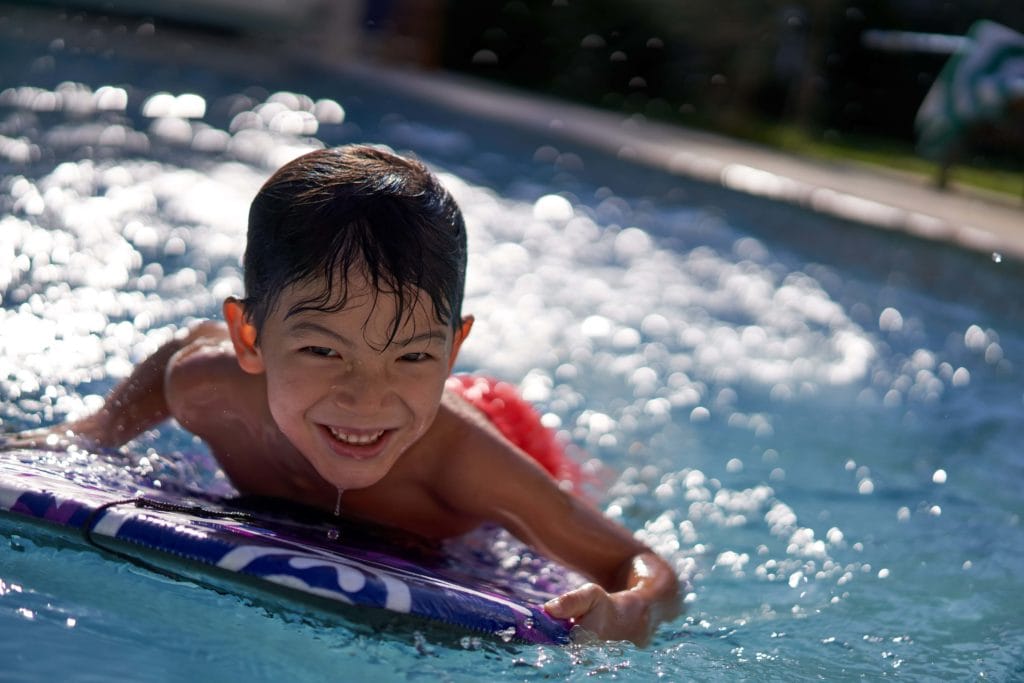
Swimming pools are all fun and games until a kid gets hurt. Unfortunately, swimming in a pool is a common way for children to get hurt and potentially drown.
As a pool owner, this is a scary thought. The good news is that there are ways to keep your pool safe for kids.
We have put together eleven ways to keep your pool safe, but nothing beats high levels of adult supervision. Always keep this in mind.
 The 11 Ways to Keep Your Pool Safe for Kids
The 11 Ways to Keep Your Pool Safe for Kids
1. Fence

Installing a fence may very likely be a local ordinance in your town, and you had no choice but to build one. If you do have an option to build a fence or not, you should seriously consider doing it. There is an absolute peace of mind that comes with knowing the pool area is locked down for the night.
When it comes to fencing, you can spend very little or tens of thousands of dollars. It all depends on the look you are going for around the pool. The most important thing to consider when doing the fence are the gates and locks that you use. Make sure that a child cannot reach the lock for the entrance and always have a pool gate that opens outward and not in. This will help with kids getting in front of you and running into the pool before you can catch them.
2. Pool Alarm
A pool alarm is an excellent investment if you have young children. Although they can be a bit pricey, they have saved many lives. The pool safety alarm will sound when the water displaces about the same amount that it would if a one-year-old child fell in.
When the child falls in an alarm will sound not just outside but also in your home. The scariest part of child drowning accidents is that there is no warning, and there is no fight. The child falls in and drowns, and it happens fast. The pool alarm helps to make sure that you can get the child the help they need as fast as possible.
3. Diving Board
A diving board is an unsafe thing to have in a pool. As many times as you can tell children that they need to be careful and that the diving board can be dangerous, they are kids and will likely not listen. We honestly recommend that homeowners just get rid of their diving boards. Allowing children to jump into the pool at all is waiting for a disaster. Of course, we all know about diving issues from diving in water that is too shallow, but there are many accidents caused by kids jumping onto other kids.
Young swimmers already having trouble in the deep end cannot withstand the impact when someone jumps on or near them. Getting rid of the diving board and implementing a no diving rule will seriously up the security measures around your pool.
4. Clean the Pool Area
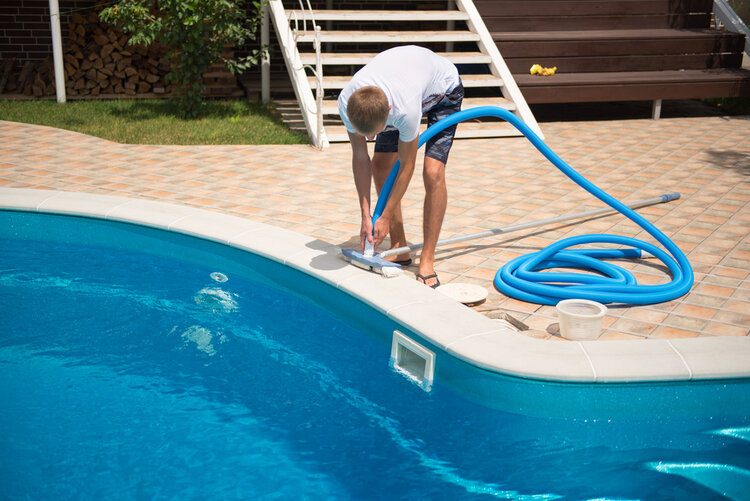
Cleaning the pool area is more important than you might think. When kids leave pool toys, goggles, and floats all around the pool deck, there is a significant change someone can trip and fall into the water. Many drowning accidents are not caused by curious kids who try swimming when their parents are not around; they are caused by trips and falls when no one is looking.
In addition to making sure that the pool area is clear of debris, it is also essential to keep the deck area free of mold and algae. Anything green growing on the deck will be very slippery. Spray the area down with bleach once a month or so, just watch out for plants nearby, so they don’t get hurt by the bleach spray.
5. Chemical Storage
Pool chemicals are hazardous for both adults and children. Being a pool owner is a tremendous responsibility, and proper pool chemical storage is imperative. Chemicals should be stored under lock and key. Make sure that all containers are sealed tight and, if possible, keep chemicals out of the reach of children even if they were somehow to get into the locked storage cabinet. When adding chlorine or other chemicals to the pool area, keep young children away. They are not able to handle the strength of those chemicals in the same way that adults can. Even being close enough to smell the chemicals could cause serious health concerns.
6. Drain Covers

Be sure to inspect the drain covers in your pool. Public pools are held to strict regulations about drain covers as they have been known to cause deaths in children. Residential pool owners don’t have the same rules in place, but it does not hurt anyone to follow this same helpful advice. Always make sure that drain covers are rounded and that all screws are in place and tight. As a general rule of thumb, it makes sense to tell children to leave the drain cover alone as there is no need for them to be messing with it.
7. CPR
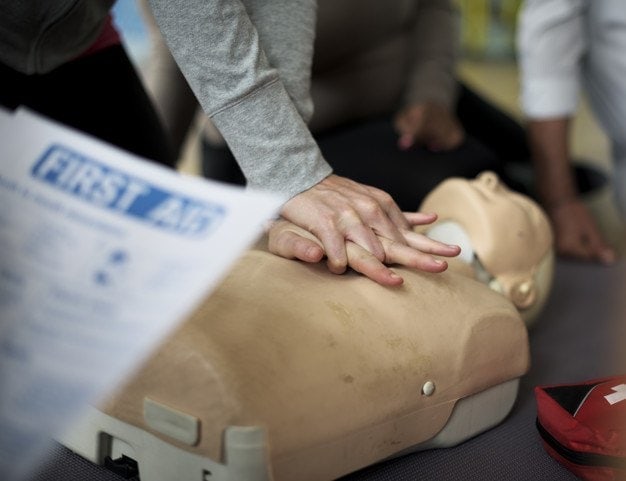
Every pool owner and every parent should know CPR. If you took a class 10 years ago, that’s great, but take another one. When it comes down to an emergency situation, you are going to want to make sure that you know exactly what to do. The chances that you may need to use your CPR training are probably pretty rare, but this is a situation where it pays to be overprepared.
8. Pool Rules
Have a sign made for your pool with the pool rules.
It seems a bit commercial, like a hotel pool, but it can be done in a friendly way. There are plenty of pre-made signs available, or you can make your own. The problem with just assuming that everyone knows the pool rules is that they don’t. You can’t expect people to understand what you are thinking. Have your pool rules address the topics of running, diving, pushing, swimming alone, and dunking. These are the most important things to make sure your guests understand your pool.
8. Swimming Lessons
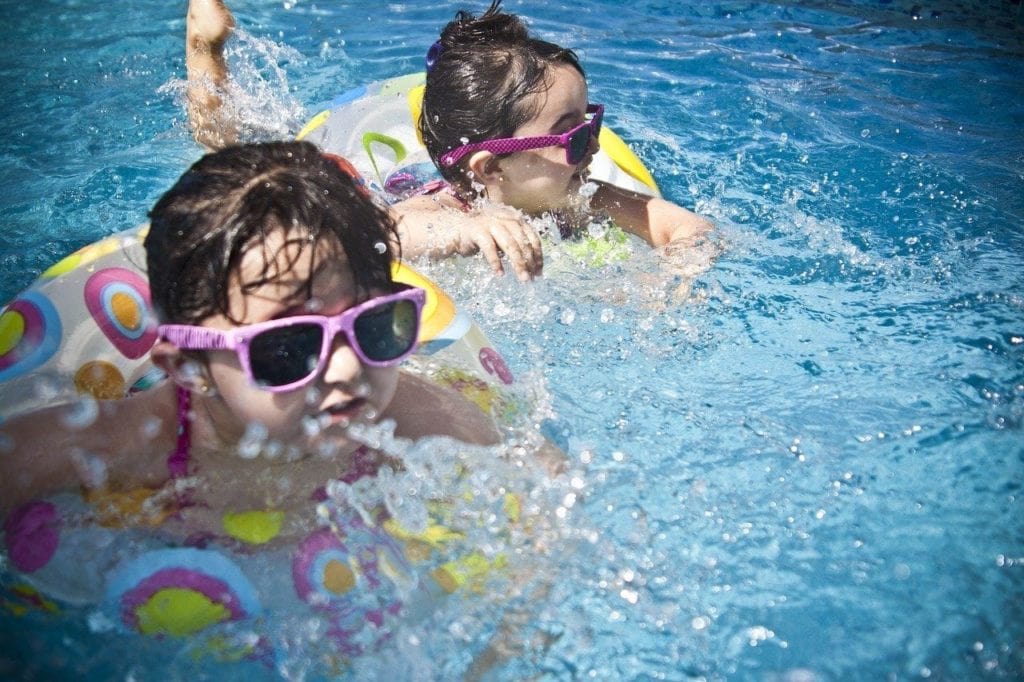
Teaching children to swim at a young age is extremely important. You can put all these safety measures into place, but there is no substitute for kids knowing how to save themselves should they fall into a pool. Some programs will teach children as young as six months old how to get to their back and float. A child of this size would not have much time if they ever accidentally fell in; being able to float is truly a lifesaver.
If you live in an area where children are only swimming for part of the year, have them take a refresher course every spring. At the beginning of the season, kids may be nervous and forget some of their skills. Doing a quick refresher can help them get off to a good start and feel like a stronger swimmer right from the beginning of the season.
9. Door Alarms
We already discussed how vital pool alarms are, but there is one significant downside to a pool alarm. If your pool alarm sounds, there is already an emergency. Your child has fallen into the pool. An option that works very well in addition to the pool alarm is the door alarm. A door (or window) alarm will sound as soon as the door is opened. This may give you the time you need to grab your child before they fall into the pool.
These few seconds can mean the difference between life and death. A combination of the door alarm and pool alarm is the safest method.
10. Pool Light Inspection
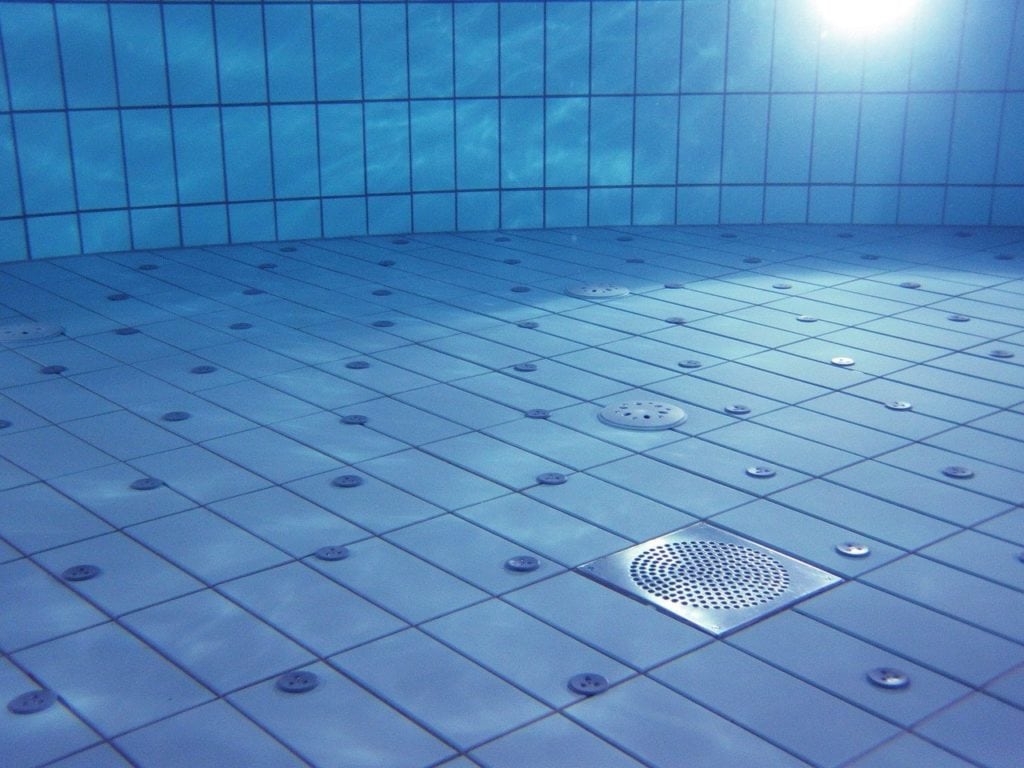
Each year be sure to have your pool lights inspected by a professional. Pool lights look very interesting to kids, and they will often swim over and touch them.
The risk of electric shock is a terrifying thing. As the years go on and your pool and pool lights age, there is always a chance that there could be an issue. Having the light inspected every year will give you peace of mind the next time one of your friend’s kids wants to see the pool light up close and personal.
 In Conclusion
In Conclusion
As we said right from the start, the only way to ensure complete safety when it comes to children in the pool is constant adult supervision. The times when accidents happen are always when you least expect it. Sometimes there can be 15 adults around a pool enjoying themselves, and nobody notices a child in distress. Be sure that all swimmers know the rules, be sure that one person is always watching the kids in the pool, and don’t ever expect that you will hear your child fall into the pool and struggle; you won’t. Although pool safety procedures take time and a little money, it is the best money you will spend if you are never faced with a pool-related accident or tragedy.
Featured Image Credit: Drew Gilliam, Unsplash
Contents


 The 11 Ways to Keep Your Pool Safe for Kids
The 11 Ways to Keep Your Pool Safe for Kids